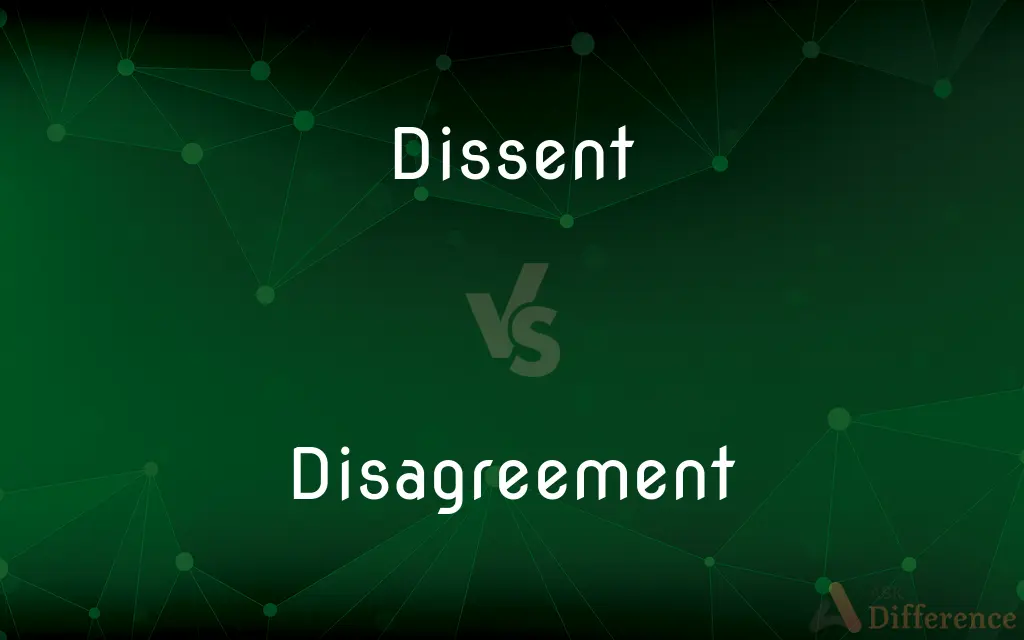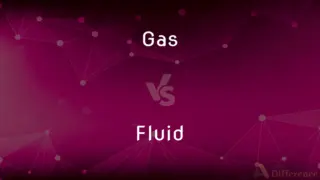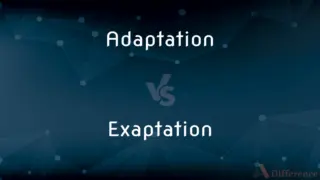Dissent vs. Disagreement — What's the Difference?
By Maham Liaqat & Urooj Arif — Updated on May 21, 2024
Dissent implies a strong, often formal, opposition to a prevailing idea or policy, while disagreement is a general lack of consensus or difference in opinion.

Difference Between Dissent and Disagreement
Table of Contents
ADVERTISEMENT
Key Differences
Dissent is typically associated with a more profound and principled objection, often against authority or dominant views. For example, a judge may dissent from a majority opinion in court, indicating a formal and strong opposition. Disagreement, however, is broader and less intense, simply indicating that two or more parties hold different views. For instance, friends might have a disagreement over where to eat dinner, which is less formal and more casual.
Dissent often carries a sense of activism or resistance. It implies a deliberate stand against a prevailing view, sometimes involving organized movements or protests. In contrast, disagreement does not necessarily involve any action beyond the expression of differing opinions. People can disagree on various subjects without any intention of challenging or changing the status quo.
In legal and political contexts, dissent can be a significant act, sometimes leading to changes or reforms. A dissenting opinion in court can influence future interpretations of the law. Disagreement, on the other hand, is a common occurrence in everyday discussions and debates, usually resolved through dialogue and compromise.
Dissent also often implies a minority stance against a majority. It suggests a separation from the consensus, highlighting a fundamental divide. Disagreement can occur between equals or peers without necessarily indicating a minority or majority dynamic. It’s a neutral term describing any situation where opinions diverge.
Comparison Chart
Intensity
Strong, formal opposition
General lack of consensus
ADVERTISEMENT
Context
Often legal, political, or formal settings
Everyday discussions and debates
Implication
Resistance, activism
Simple difference in opinion
Authority Relation
Often against authority or dominant views
Neutral, among equals
Common Usage
Minority stance in formal settings
Any differing opinion in various contexts
Compare with Definitions
Dissent
Strong disagreement with an official decision.
The judge issued a dissent in the case.
Disagreement
An instance of differing views.
Disagreements in politics are common.
Dissent
Expression of a differing opinion in a formal context.
The senator’s dissent was noted in the records.
Disagreement
A minor conflict or argument.
Their disagreement was over a trivial matter.
Dissent
Minority opinion in a legal judgment.
The court’s decision included a powerful dissent.
Disagreement
A point where two parties do not concur.
The disagreement on the project’s timeline caused delays.
Dissent
Dissent is an opinion, philosophy or sentiment of non-agreement or opposition to a prevailing idea or policy enforced by a government, political party or other entity or individual in a capacity of contextual authority. A dissenting person may be referred to as a dissenter.
Disagreement
Lack of consensus or approval
Disagreements between parents and adolescents
There was some disagreement about the details
Dissent
The holding or expression of opinions at variance with those commonly or officially held
There was no dissent from this view
Disagreement
A failure or refusal to agree.
Dissent
Hold or express opinions that are at variance with those commonly or officially held
Two members dissented from the majority
Disagreement
A disparity; an inconsistency.
Dissent
To have or express an opinion different from a prevailing or official position; disagree.
Disagreement
A conflict or difference of opinion.
Dissent
(Law) To reach a conclusion contrary to the majority of the judges deciding a case; render a minority opinion.
Disagreement
A quarrel.
Dissent
Difference of opinion or feeling; disagreement.
Disagreement
An argument or debate.
They had a bit of a disagreement about what color to paint the bedroom, but they have reached a compromise.
Dissent
The refusal to conform to the authority or doctrine of an established church; nonconformity.
Disagreement
A condition of not agreeing or concurring.
The theory shows considerable disagreement with the data.
Dissent
(Law) A judicial opinion reaching a conclusion contrary to that reached by the majority of judges deciding a case; a minority opinion. Also called dissenting opinion.
Disagreement
The state of disagreeing; a being at variance; dissimilitude; diversity.
Dissent
(intransitive) To disagree; to withhold assent. Construed with from (or, formerly, to).
Disagreement
Unsuitableness; unadaptedness.
Dissent
(intransitive) To differ from, especially in opinion, beliefs, etc.
Disagreement
Difference of opinion or sentiment.
Dissent
(obsolete) To be different; to have contrary characteristics.
Disagreement
A falling out, or controversy; difference.
Dissent
Disagreement with the ideas, doctrines, decrees, etc. of a political party, government or religion.
Disagreement
A conflict of people's opinions or actions or characters
Dissent
An act of disagreeing with, or deviating from, the views and opinions of those holding authority.
Disagreement
A difference between conflicting facts or claims or opinions;
A growing divergence of opinion
Dissent
(Anglo-American common law) A separate opinion filed in a case by judges who disagree with the outcome of the majority of the court in that case
Disagreement
The speech act of disagreeing or arguing or disputing
Dissent
(sports) A violation that arises when disagreement with an official call is expressed in an inappropriate manner such as foul language, rude gestures, or failure to comply.
Disagreement
A difference in opinion.
They had a disagreement about the best route to take.
Dissent
To differ in opinion; to be of unlike or contrary sentiment; to disagree; - followed by from.
The bill passed . . . without a dissenting voice.
Opinions in which multitudes of men dissent from us.
Disagreement
Lack of consensus or harmony.
There was a disagreement among the committee members.
Dissent
To differ from an established church in regard to doctrines, rites, or government.
Dissent
To differ; to be of a contrary nature.
Dissent
The act of dissenting; difference of opinion; refusal to adopt something proposed; nonagreement, nonconcurrence, or disagreement.
The dissent of no small number [of peers] is frequently recorded.
Dissent
Separation from an established church, especially that of England; nonconformity.
It is the dissidence of dissent and the protestantism of the Protestant religion.
Dissent
Contrariety of nature; diversity in quality.
The dissent of the metals.
Dissent
(law) the difference of one judge's opinion from that of the majority;
He expressed his dissent in a contrary opinion
Dissent
A difference of opinion
Dissent
The act of protesting; a public (often organized) manifestation of dissent
Dissent
Withhold assent;
Several Republicans dissented
Dissent
Express opposition through action or words;
Dissent to the laws of the country
Dissent
Be of different opinions;
I beg to differ!
She disagrees with her husband on many questions
Dissent
Refusal to accept a commonly held opinion.
Her dissent from the group's view was clear.
Dissent
Opposition to the policies of a governing body.
Political dissent is essential in a democracy.
Common Curiosities
Can dissent lead to changes in law?
Yes, dissenting opinions in court can influence future legal interpretations and reforms.
Is disagreement always less intense than dissent?
Generally, yes. Disagreement is less intense and formal compared to dissent.
Is dissent considered a minority stance?
Yes, dissent often represents a minority opinion against the majority.
Can disagreement occur in formal settings?
Yes, disagreement can occur in any setting, though it is usually less formal than dissent.
Is dissent always against authority?
Typically, dissent involves opposition to dominant views or authority.
Can two friends have dissent?
Not usually; they would more likely have a disagreement.
Does dissent imply activism?
Often, yes. Dissent can involve organized resistance against prevailing views or policies.
Can dissent be part of a democratic process?
Yes, dissent is a vital aspect of democracy, allowing for diverse opinions and reforms.
What is the main difference between dissent and disagreement?
Dissent is a strong, formal opposition, often in legal or political contexts, while disagreement is a general difference in opinion.
Does disagreement imply action?
Not necessarily. Disagreement may simply involve differing opinions without further action.
Does disagreement need to be formal?
No, disagreement can be informal and casual.
Does disagreement always imply conflict?
Not always. Disagreement can be resolved amicably without conflict.
Can dissent be expressed silently?
Yes, dissent can be expressed through non-verbal actions like protests.
Can dissent exist without disagreement?
No, dissent is a form of disagreement but with stronger opposition.
Is disagreement negative?
Not inherently. Disagreement is a normal part of discussions and can be constructive.
Share Your Discovery

Previous Comparison
Gas vs. Fluid
Next Comparison
Adaptation vs. ExaptationAuthor Spotlight
Written by
Maham LiaqatCo-written by
Urooj ArifUrooj is a skilled content writer at Ask Difference, known for her exceptional ability to simplify complex topics into engaging and informative content. With a passion for research and a flair for clear, concise writing, she consistently delivers articles that resonate with our diverse audience.
















































